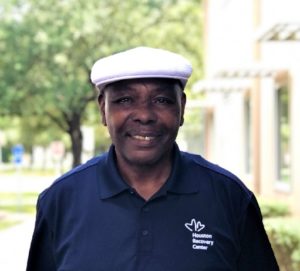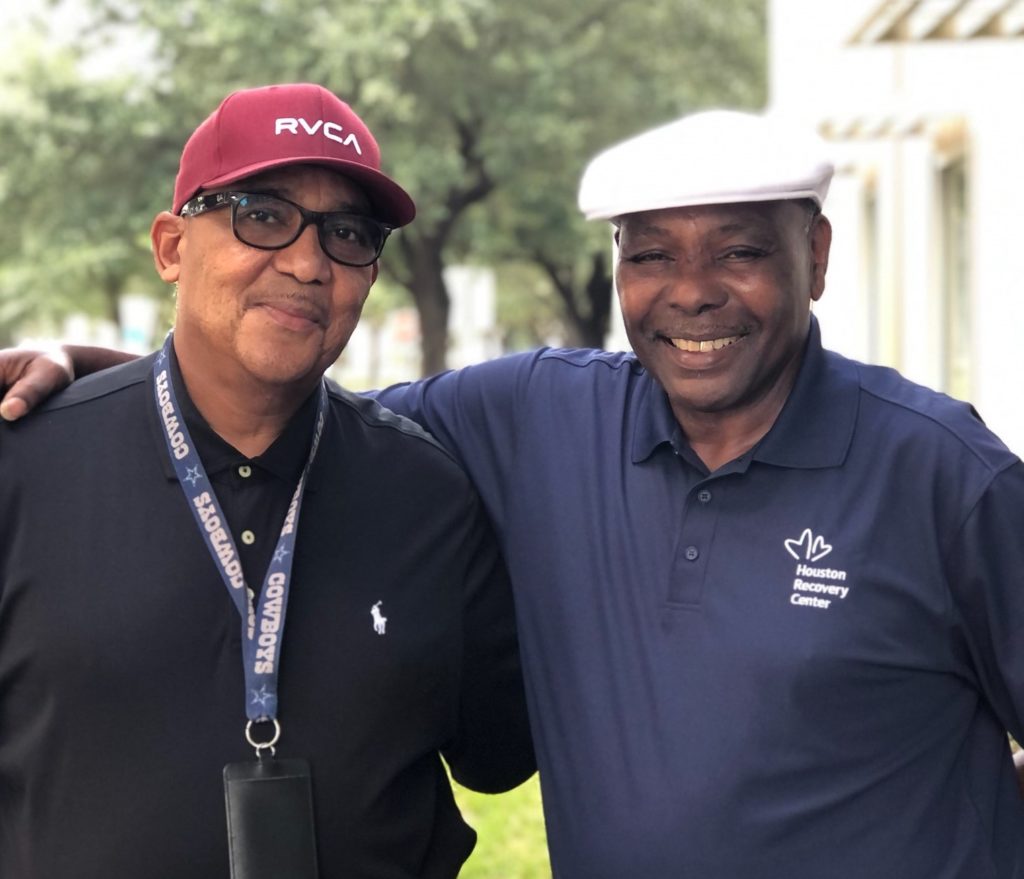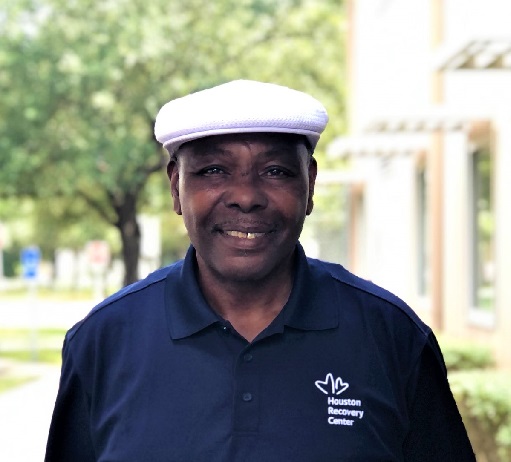From Sobering Center Client to Sobering Center Employee
by Vicki Powers
 before: Mervin Moore’s introduction to substance use started as a baby when his parents put beer in his bottle to help him sleep. Moore’s childhood was filled with abuse, an unstable childhood, trust issues, and 25 years of drug use. He cycled in and out of treatment and sober living homes only to begin using again once he left. He reached a tipping point with his final relapse: he recognized the insanity of his repeated behavior.
before: Mervin Moore’s introduction to substance use started as a baby when his parents put beer in his bottle to help him sleep. Moore’s childhood was filled with abuse, an unstable childhood, trust issues, and 25 years of drug use. He cycled in and out of treatment and sober living homes only to begin using again once he left. He reached a tipping point with his final relapse: he recognized the insanity of his repeated behavior.
after: Moore connected with Houston Recovery Center and worked with John Turner as his recovery coach in their 18-month Partners in Recovery Program. He quit using drugs October 4, 2017, a date he’ll never forget. Moore got a job, housing, became a peer specialist, and worked the program. He started working at Houston Recovery Center July 26, 2021.
“I slept on that bed (in the sobering center). God has allowed me to come full circle from where I started.”
Background
Beer in his baby bottle kicked off Mervin Moore’s life-time struggle with substance use disorder. At 12, Moore made a conscious decision to drink beer and smoke marijuana. His childhood, raised by an alcoholic dad who served in the Navy, was riddled with verbal, mental, and physical abuse. Moore describes his parents as irresponsible, who ultimately gave Moore and his sister to an uncle to be raised.
Moore started developing trust issues at age 13 when a woman showed up in his life saying she was “his mama.” He followed her to New Orleans because the abuse in his current home was overwhelming. He bounced from home to home: from his grandmother’s to his biological dad’s in Corpus Christi.
At 17, Moore enlisted in the Army when his family asked him to move out on his own. He went to Germany and started using alcohol and drugs more.
“Free time in the military is drinking,” Moore relates. “But I didn’t believe I was an alcoholic. Then I started using pills, cocaine, and acid.”
Moore had a lot of anger from his childhood, and he didn’t know how to release it. His drug habit became progressively worse. He went to military prison in Ft. Leavenworth, Kansas, after taking money sitting on a counter.
“I came back (from prison) angry and was always fighting,” Moore says. He didn’t receive any counseling from the military, which he believes would have been helpful. He eventually received a bad conduct discharge from the Army.
Taking it Up a Notch
After he returned from the Army, Moore went to live with an adoptive brother in Corpus Christi, Texas. Moore told him, “I’m drunk, and I don’t want to feel like this anymore.” His brother shot him up with preludes, and Moore says he “fell in love instantly.” He started shooting preludes and cocaine. Moore had to find a way to support his habit, so he sold drugs to use drugs and ultimately used for 25 years.
In and out. In and out. In 2002, Moore went to a long-term residential treatment facility in New Orleans for a year for substance use disorder. Five different times. Once he was released, he would start smoking crack again.
After Katrina hit in 2005, the staff and residents dispersed. Moore went to Waco and received assistance including FEMA money, an apartment and furniture.
“Then I got a house from the city of Waco, and I sold the furniture and appliances for the money,” Moore says. “That was a new low for me.”
In 2007, Moore knew he needed treatment. He went to treatment and was discharged for insubordination. This time he recognized the insanity of repeating the same mistake over and over. A light came on.
“They said I needed to go to meetings, work my 12 Steps, build a support group,” Moore says.
A successful recovery path started falling in place for Moore. He got a sponsor, started working his 12 Steps, and got on his knees each day praying, “Just for today I don’t want to use.” He also started bringing meetings to treatment facilities, which helped him stay sober.
In seven years, Moore became certified as a peer support specialist and enrolled in college while working a full-time and part-time job. Yet he got complacent after a devastating life event occurred. Moore stopped going to meetings after he learned he had a cancerous spot on his liver.
“I now realize it was an excuse, and I was having a behavioral relapse after 7 ½ years,” Moore states. “I smoked crack for two days before I had my surgery.”
Unfortunately, Moore quickly fell to his old behaviors after he recovered from surgery. His neighbor asked him to smoke weed, which led him to smoking crack. Things quickly progressed, and he began selling weed, crack, and heroine.
A Trip to Houston = Jail
Moore took a trip to Houston to buy marijuana and got picked up by police for possession. He went to Harris County jail for five months. When he got out, he had nowhere to go.
“I used to say I lost everything, but in recovery I now say ‘I gave everything away,’” Moore says.
Moore went to Star of Hope because he didn’t know where to go. As he was walking along the sidewalk nearby, he noticed the sign for the sobering center. He walked in and said he needed inpatient residential treatment. He knew the lingo.
A New Life
 Houston Recovery Center took him in and he slept on a cot for several days at the sobering center waiting for placement.
Houston Recovery Center took him in and he slept on a cot for several days at the sobering center waiting for placement.
October 4, 2017 is Moore’s sobriety date. John Turner worked as Moore’s recovery coach at Houston Recovery Center for more than the 18-month program. Moore says his support in the early months was very crucial. He would still call Mr. Turner periodically to let him know he was still on track and “thank you for my beginning with you,” Moore says.
“God put people in my life to help me get where I am today,” Moore states. “I would take one step and God would take two more. I take credit for the effort and give God the glory for opening the door.”
Moore knew his first priority was housing and then employment. He became a certified peer support specialist through Via Hope but discovered he needed two years of sobriety before getting a position in that field.
“I was still pursuing and very persistent in working at Houston Recovery Center,” Moore states. He first applied in 2019 but didn’t get a response. Then in July 2021, Moore received a call from Houston Recovery Center about a peer recovery support specialist position.
“I believe it was God’s divine intervention to put me here to work,” states Moore. “I slept on that bed. God has allowed me to come full circle from where I started.”
Moore started working at Houston Recovery Center July 26, 2021 as field recovery support specialist. His message to clients that come through the sobering center: “I laid on that floor, and I have found success in recovery. If I can find success, you can, too.”
Pursuing recovery
What made a difference for Moore this last time around? He said his determination.
“The relapse I experienced was the worst I ever had: geographical change to Houston, then jail, then homelessness and alone. It was the worst, but also my gift,” Moore states. “I can’t forget what it feels like to be homeless.”
Moore is proud of many areas in this life now, including:
- the passion he has to help people find what he’s found in recovery,
- his enthusiasm and motivation for recovery because it worked for him, and
- coming back where he started (Houston Recovery Center) so he can help someone else.
Today, Moore is very involved and adamant about his 12 Steps. He also is a Wellness Recovery Action Planning (WRAP) facilitator, which is a mental health recovery plan for those with dual diagnosis. Moore also leads a meeting twice a month called P11 for those who suffer from substance use and mental health.
“Mental health and substance use has to be addressed,” he says.
